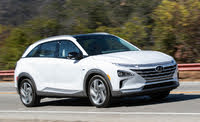Does more tyre thread slow the car?
I read somewhere that the thread makes up about 40% of the weight of a tyre.
When changing to new tyres with the same height recently, I noticed that the
car felt slower off the line. Given that the previous tyres were worn down to
about 3mm, whereas the new ones have about 9mm of thread, this would
mean that there is about 2 kgs ekstra on the very outer edge of the wheel,
where added weight would contribute the most to moment of inertia. It also
means that the new tyre is about 12mm more in diameter.
When weighing the two complete wheels, I found that the new one is about
3kg heavier, so that mean be 2 on the tyre and 1 on the new wheel/rim, which
is 16" x 7.5" compared to the stock which is 15" x 5.5".
Are these factors enough to explain the loss of power? What contributes more
to the slowing of the car - the slightly larger alu wheel, or the increased
diameter/thread weight of the tyre? Will it make sense to look for lighter rims
(they are 9.3 kgs), or simply chip tune the car?
